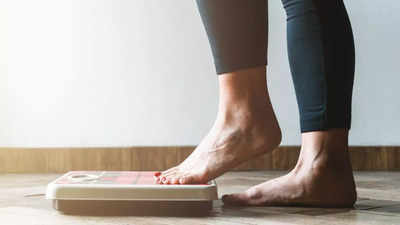- News
- lifestyle
- health-fitness
- diet
- How this simple calorie math can help in weight management
Trending
How this simple calorie math can help in weight management
Calorie intake is key to weight management. Men need between 2,200 to 2,800 calories daily while women require between 1,800 to 2,200. Adopting a meal division of a 30-30-20-20 split can help manage calories effectively throughout the day.

Losing weight requires a ton of effort. Weight management requires a balanced approach to eating habits and exercise. One of the most important ideas in weight control is understanding how calories work. Your calorie intake is the fundamental variable that can determine whether you gain, lose, or stay the same weight. Throughout the day, you may design your meals, improve your digestion, and lead a healthier lifestyle by following a basic division of calories.

How much should you eat in a day?
Reducing calories by around 500 per day is recommended to achieve a healthy weight reduction pace of half a kg per week. This deficit can be achieved through a combination of diet and exercise, but the key is to ensure you are still getting enough nutrients to support your body’s functions.

Why is it important to reduce calorie intake wisely
Although cutting calories is a good way to maintain weight, eating healthfully also plays a key role. The quality of the calories we consume is just as important as their quantity. Whole grains, vegetables, and proteins are a few examples of these foods. We can reduce their calorie intake by removing high-fat junk food, sugar-filled beverages, and processed snacks.
Enjoy your meal, and stop eating when you're satisfied rather than when you're full. Drinking water before meals does help with decreasing hunger.
How important is your meal timing?
The simple math for calorie-split meals
One effective method for managing your calories throughout the day is the 30-30-20-20 split. This approach divides the total daily calorie intake into 4 sections: breakfast, lunch, dinner, and snacks.
Breakfast gives us energy for the rest of the day and speeds up our metabolism, so it should make up about 30% of our daily caloric consumption. Select easier-to-digest foods such as fruits, eggs, and whole grains. Since heavier and oilier foods tend to make you feel tired, eat light in the morning.
30% for lunch: An additional thirty percent of your daily calories should come from this lunch. To feed your body for the afternoon, choose lean meats, complex carbohydrates, and an abundance of greens. This is when you should eat items high in calories to get you through the day.
20% for dinner: Our digestive system becomes less effective as the day comes to an end. It's recommended to limit dinner to 20% of your day's caloric intake. focus on foods that are simple to digest, such as salads, soups, or grilled veggies paired with lean proteins. Try to eat dinner at least 2 to 3 hours before going to bed to avoid disruptions.
End of Article
FOLLOW US ON SOCIAL MEDIA










